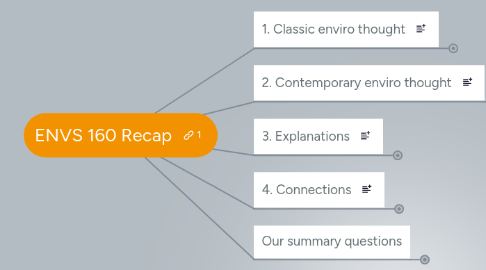
1. 1. Classic enviro thought
1.1. Reductionism
1.1.1. IPAT
1.2. Essentialism
1.2.1. Us vs. Nature
1.2.2. Neo-Malthusianism
1.3. Apocalyptic
1.3.1. Malthusianism
1.3.2. Tragedy of the Commons
1.3.3. Population bomb/ IPAT
1.4. Ecospirituality
1.4.1. Shallow vs. Deep Ecology
1.4.2. Ecotopia
1.4.3. Lynn White
2. 2. Contemporary enviro thought
2.1. Response to Classics
2.1.1. Ellis (anti- limits)
2.1.1.1. Solution= planetary stewardship
2.1.2. Anti- Reductionist
2.1.2.1. Latour
2.1.2.2. Ostrom- anti- "Tragedy of the Commons"
2.1.3. Anti- Essentialist
2.1.4. Anti-Apocalyptic
2.1.4.1. Shellenberger & Nordhaus (anti-apocalyptic)
2.1.4.1.1. technology is a gamble
2.1.4.1.2. technology is natural, has gotten us to where we are
2.1.4.1.3. by solving problems, we will inevitably create new ones (LOVE your monsters)
2.2. Rethinking Natural
2.2.1. Problem with Purity
2.2.2. Realism, constrained constructivism
2.3. Rethinking Local
2.3.1. Burgerville- what defines local, the levels of local
2.3.2. Liborion- scales. Municiple vs. individual
2.4. Rethinking Solutions
2.4.1. Maniates (lifestyle changes/ green consumerism is not equivalent to social change)
2.4.1.1. Guthman- Neoliberalism, response to Pollen
2.4.2. Defries- SCALES --> solutions need to be specific to geological/temporal scales
2.4.3. Lach et al- Grid group theory
2.4.4. "Anti- utopianism", global approaches
2.4.5. Wicked problems, clumsy solutions
3. 3. Explanations
3.1. Population & Scarcity
3.1.1. Scarcity of resources
3.1.2. Innovation of use of resources/ management
3.2. Markets & Commodities
3.2.1. Market management of resources
3.3. Institutions & "The Commons"
3.3.1. Scale matters - how to coordinate/ cooperate within institutions
3.3.1.1. Multiple actors/influences
3.4. Environmental Ethics
3.4.1. Beliefs / culture influence how we view & treat the world
3.5. Risks & Hazards
3.5.1. Informed decisions & risk perception
3.6. Political Economy
3.6.1. Commodification of nature
3.6.1.1. Accumulation of wealth
3.6.1.1.1. Spatial Fix
3.7. Social Construction of Nature
3.7.1. Cultural relativity
3.7.1.1. "Nature"
3.8. Combination of explanations from classic and contemporary scholars
3.8.1. Explain the cause and also a potential solution
4. 4. Connections
4.1. Interdisciplinary Approach
4.1.1. Economics
4.1.2. System as a whole, not the individual
4.2. Greenwashing
4.2.1. Ethical?
4.3. Situated Objects
4.3.1. Trees, Wolves, Bottled Water, Tuna
4.4. Blame on the consumer
4.4.1. disproportionate focus on perpetrators and problems
4.4.2. Too much time focused on right & wrong, look forwards together instead
4.5. Unproductive/Misfocused Environmentalism
4.5.1. Ideas work in theory not in practice
4.6. Long-term thinking & consequences
5. Our summary questions
5.1. Is there a right answer?
5.1.1. How serious are environmental problems, and why is that info unclear?
5.1.1.1. How do we know what info to trust and what sources are reliable
5.2. Where do we go from here?
5.2.1. What are the barriers that stand in our way to getting toward a solution (or multiple solutions)?
5.2.1.1. Will policies change first, or will people?
